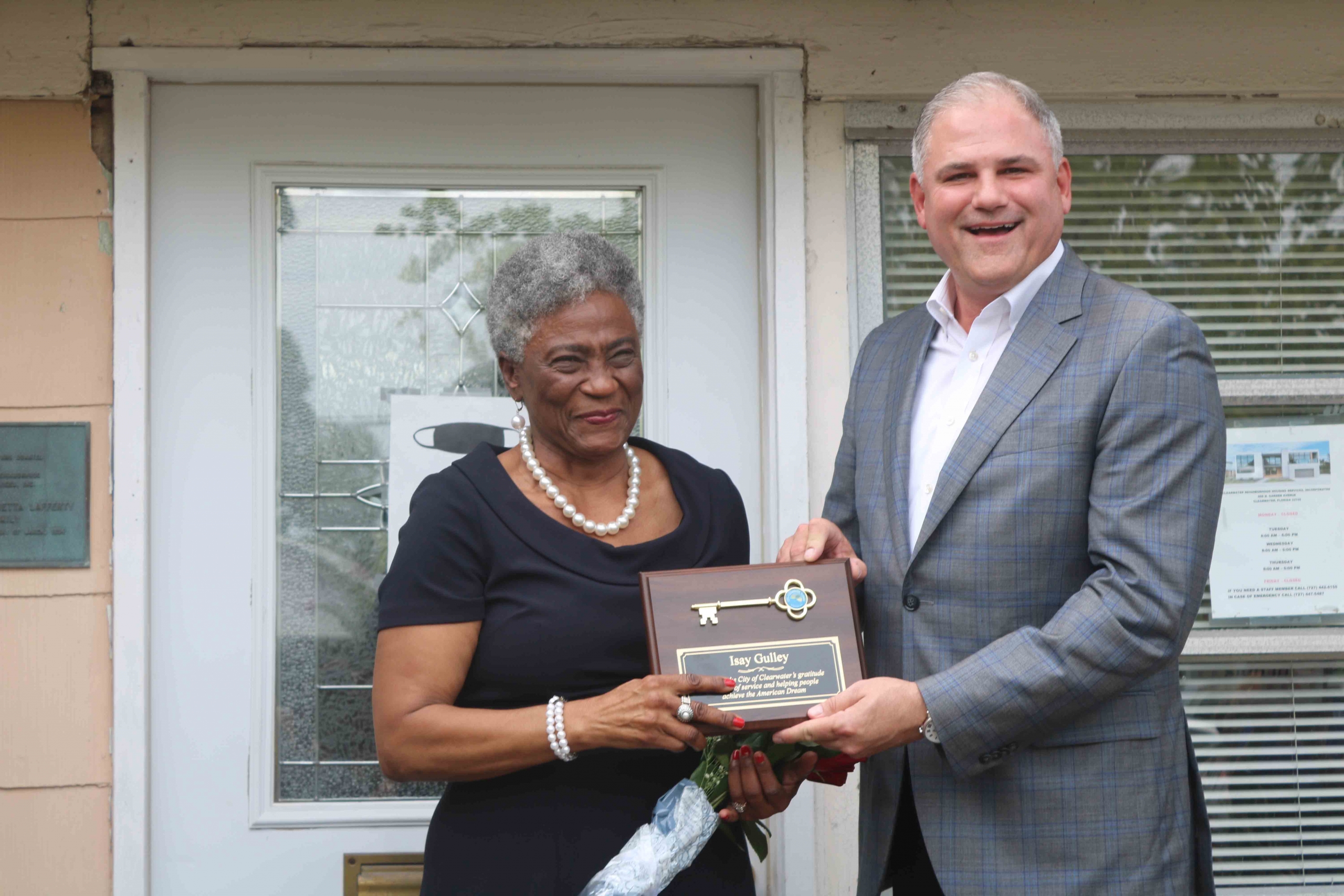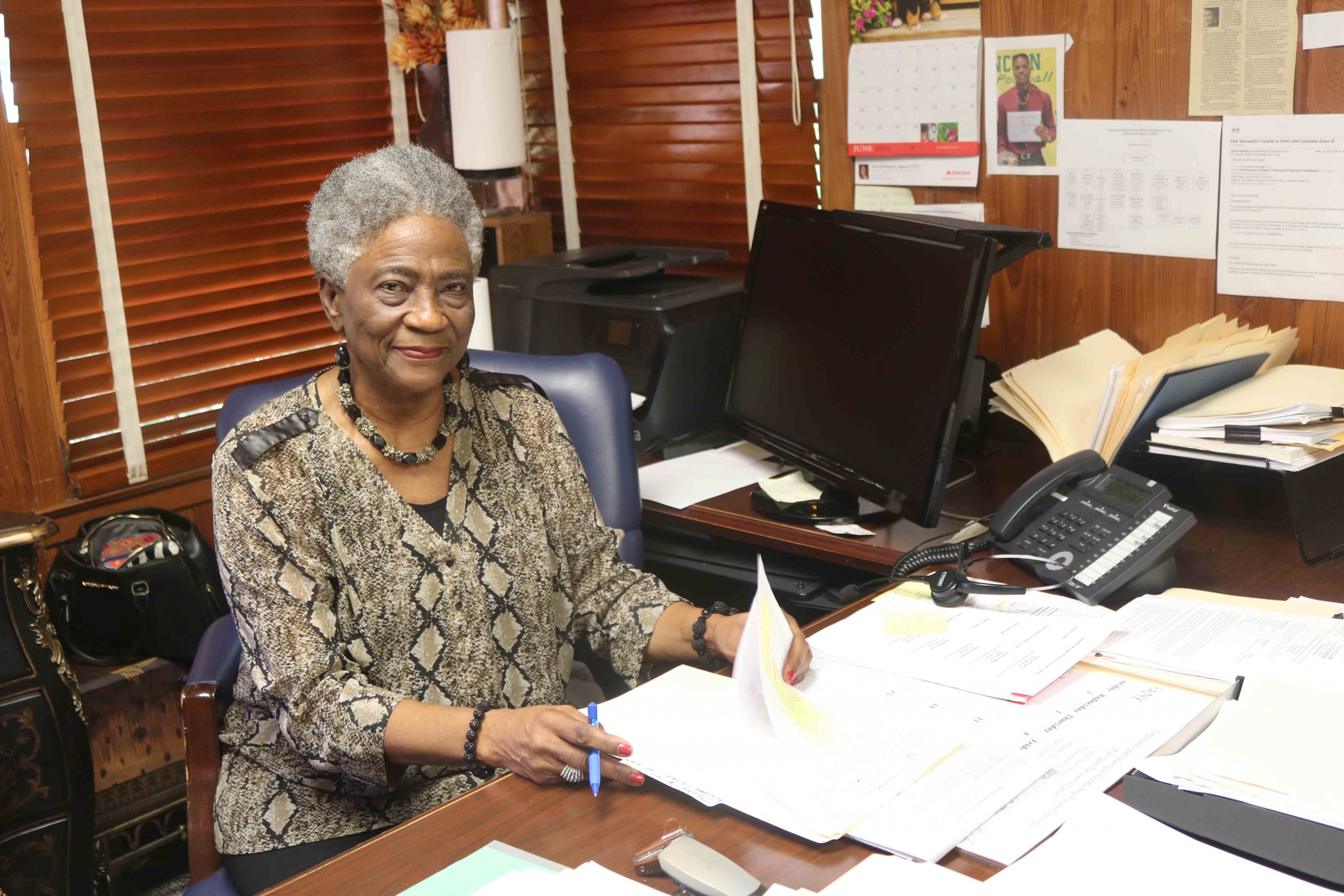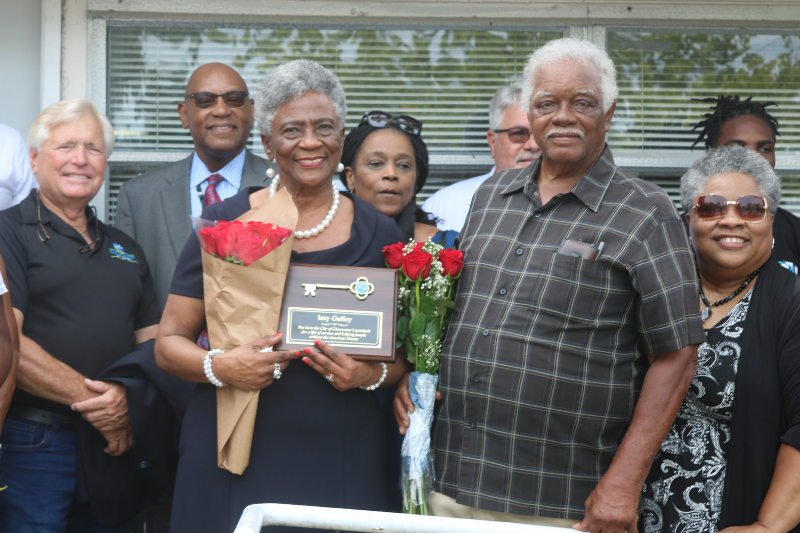On June 15, after 41 years of service, Isay Gulley retired from Clearwater Neighborhood Housing Services, Inc. She was presented the key to the city of Clearwater with her family, friends, and coworkers in tow. Seen here with her husband, Donald R. Gulley Sr., and the late City Manager Bill Horne in the back row.
BY J.A. JONES, Staff Writer
CLEARWATER – Isay Gulley received the key to the city of Clearwater upon her retirement from Clearwater Neighborhood Housing Services, Inc., surrounded by colleagues, friends, and family this past June.
The presence of Clearwater’s Mayor Frank Hibbard and the late long-term City Manager Bill Horne, co-workers, former employees, board members, family, and other well-wishers at the surprise key ceremony was only one testament to Gulley’s impact on the city.

Clearwater’s Mayor Frank Hibbard presented Isay Gulley with roses and the key to the city on June 15 at Clearwater Neighborhood Housing Services, Inc.
Days later, a drive-by celebration for Gulley was held. City officials and old friends drove by honking while fire engines and police cars flashed their lights in Gulley’s honor. Cars wrapped the blocks, as well-wishers went by to celebrate a legend. The carloads held the lives and memories of decades of Clearwater residents impacted by the work Gulley did for more than 40 years at CNHS.
To the many people driving by to honor her that day, Gulley symbolized one empowering thing above all else: a home community.
Pearl Johnson has served on the CNHS board since 1984. “CNHS has been the soul of Isay Gulley. She has helped many people, not just in housing,” recalling Gulley’s efforts to take on issues including crime in Greenwood as just one additional area she strove to improve during her tenure.
Johnson recalled watching Gulley train three directors for the organization before deciding enough was enough.
“She trained three directors, that didn’t work out. I was board president at the time, and I said to the board members, ‘I will not ask this woman to train another person. If she’s capable of training, she’s capable of running this organization.’”

Isay Gulley joined Clearwater Neighborhood Housing Services, Inc. in 1980, became assistant director in 1983 and director by 1990.
While management might have been a daunting task, Johnson said, “When Isay took it over, she made it look like a cakewalk.” And Gulley’s finesse in her role was obvious to many, noted Johnson, who recalled going to workshops and housing organization meetings with national organizations where “everybody wanted to get to Isay Gulley.”
“She is well known throughout the housing organizations,” Johnson added, hailing Gulley’s expansive knowledge of housing regulations as one of the many qualities that made her a valuable asset to many.
“This woman retains knowledge like no one I had ever come in contact with. She could answer questions right off; if someone asked about a specific regulation, she knew it. If we were having breakfast, they would come in and apologize for interrupting her, but they would still ask a question. She would stop eating and give them an answer.”
Gulley recalled several jobs she held before going to Clearwater Neighborhood Housing, including working as a family counselor for five years before hearing about a nonprofit that was starting in South Greenwood.
She was already a Coast Guard Reservist, the first Black woman recruited in the area, and serving in the Coast Guard Base in St. Pete when Clearwater Neighborhood Housing came along. She served for 22 and a half years before retiring in 1999.
Gulley was debating whether she should enlist to serve full time in the Coast Guard, but the thought of being away from her family for even more extended periods was a negative — and when she was told she could choose her position and create her title by the-then director of CNHS, she made the decision.
“Knowing that this organization was in a low-income neighborhood, and from my childhood experience with the house, I wanted to make sure that the income-challenged, or the individuals that may not have known anything about these kinds of services didn’t get taken advantage of.”
When Gulley speaks of her childhood experience, she is referring to the farmhouse her mother was forced to flee from in Shorter, Ala., in the 50s. White men came threatening to burn them out if they weren’t gone within 24 hours. Gulley’s mother took her and her sister and fled to a cottage. The girls chopped cotton to help pay the bills. For Gulley, it was a life-impacting lesson.
So, when the opportunity came to work in housing in South Greenwood, Gulley recalled that given the ability to choose her own title and role, “I started as an outreach person. And I would go out and make people aware of what the program had to offer.” Which at the time, said Gulley, was assistance to repair homes and keep them up to code.
Starting in community outreach, she became the first minority staff member. “It might have seemed like it was the lowest position, but it’s the most important one because I was in the field, talking to the people. And that was just where I needed to be.”
She joined CNHS in 1980, and with a small staff, she spent time busy in outreach but was always learning the other office roles.
“And I always would be prepared. If a vacancy come up in a position that was higher than mine — that’s how I climbed.” In 1983, Gulley became the assistant director, and in 1990, director.
She would oversee the organization during its many successful growth spurts, including moving to North Greenwood and later Tarpon Springs, as it grew to offer more services, including an SBA lender arm. Gulley would famously mastermind the award-winning renovation of the blighted Greenwood Apartments’ transformation into the upscale Palmetto Park Apartments.
Horne spoke to the Challenger one month before his death on Aug. 14 about his long-term friendship with Gulley.
“I’ve been here since 1998, and I’ve been the manager since 2000. Isay Gulley was one of the first community leaders that I met when I was appointed to the position of city manager. Aside from her being a community leader, she was also an expert in affordable housing.”
Horne recalled that while she was running CNHS, “the city had housing funds that could be used to support affordable housing. That’s what brought us together, professionally.”
Horne saw Gulley from three different perspectives, all of which added to his esteem for her. “I saw one as a very strong advocate for affordable housing for the underserved, especially in North Greenwood. I saw her as a Coast Guard Reserve officer who spent a career doing that. And then I saw her from the standpoint of a community leader.”
Gulley, in Horne’s mind, had all of the qualities that any neighborhood community would want in its community leader: she was very well informed, very professional, and “very easy to talk about tough issues with.”
Horne noted that Gulley’s temperament, knowledge, and commitment made her a significant asset for the Greenwood community to have. “She is someone who could bring people together who have different points of view.” For Horne, she was “a role model, exhibiting qualities that are helpful for people to witness on how to go about getting things done.”
Horne also acknowledged that Gulley played a crucial political role in a city not known for its strong work in encouraging equity and diversity.
“I saw her interact with the diversity within our community and our elected officials. As opposed to other communities, Clearwater hasn’t really had diversity within its ranks of elected officials. And so, she has been able to provide mentoring and some wisdom and advice to our council members who are really coming in many ways from a different perspective because they’re all white.”
Horne called her “a bridge-builder” and acknowledged that Gulley had worked very well with city staff.
“I really think that because of her gifts, she has been able to accomplish an awful lot in building new homes in the North Greenwood community,” Horne finished.
To reach J.A. Jones, email jjones@theweeklychallenger.com








